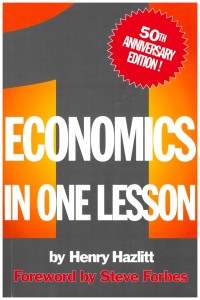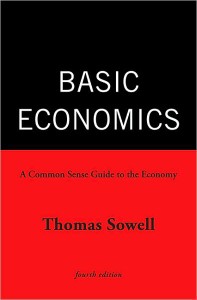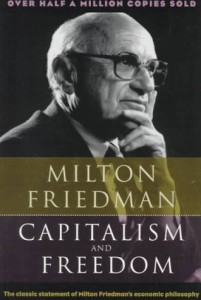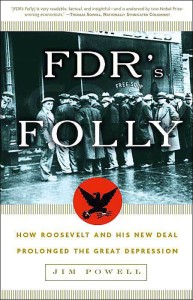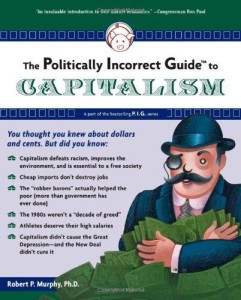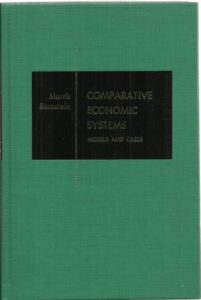ECONOMICS IN ONE LESSON
HENRY HAZLITT
From the Publisher: Considered among the leading economic thinkers of the “Austrian School,” which includes Carl Menger, Ludwig von Mises, Friedrich (F.A.) Hayek, and others, Henry Hazlitt (1894-1993), was a libertarian philosopher, an economist, and a journalist. He was the founding vice-president of the Foundation for Economic Education and an early editor of The Freeman magazine, an influential libertarian publication. Hazlitt wrote Economics in One Lesson, his seminal work, in 1946. Concise and instructive, it is also deceptively prescient and far-reaching in its efforts to dissemble economic fallacies that are so prevalent they have almost become a new orthodoxy.
Many current economic commentators across the political spectrum have credited Hazlitt with foreseeing the collapse of the global economy which occurred more than 50 years after the initial publication of Economics in One Lesson. Hazlitt’s focus on non-governmental solutions, strong — and strongly reasoned — anti-deficit position, and general emphasis on free markets, economic liberty of individuals, and the dangers of government intervention make Economics in One Lesson, every bit as relevant and valuable today as it has been since publication.
BASIC ECONOMICS
THOMAS SOWELL
From the Publisher:
Basic Economics is a citizen’s guide to economics-for those who want to understand how the economy works but have no interest in jargon or equations. Sowell reveals the general principles behind any kind of economy-capitalist, socialist, feudal, and so on. In readable language, he shows how to critique economic policies in terms of the incentives they create, rather than the goals they proclaim. With clear explanations of the entire field, from rent control and the rise and fall of businesses to the international balance of payments, this is the first book for anyone who wishes to understand how the economy functions.
CAPITALISM AND FREEDOM
MILTON FREEDMAN
From the Publisher:
How can we benefit from the promise of government while avoiding the threat it poses to individual freedom?
In this classic book, Milton Friedman provides the definitive statement of his immensely influential economic philosophy—one in which competitive capitalism serves as both a device for achieving economic freedom and a necessary condition for political freedom.
FDR’S FOLLY: HOW ROOSEVELT AND HIS NEW DEAL PROLONGED THE GREAT DEPRESSION.
JIM POWELL
From the Publisher: The Great Depression and the New Deal. For generations, the collective American consciousness has believed that the former ruined the country and the latter saved it. Endless praise has been heaped upon President Franklin Delano Roosevelt for masterfully reining in the Depression’s destructive effects and propping up the country on his New Deal platform. In fact, FDR has achieved mythical status in American history and is considered to be, along with Washington, Jefferson, and Lincoln, one of the greatest presidents of all time. But would the Great Depression have been so catastrophic had the New Deal never been implemented?
In FDR’s Folly, historian Jim Powell argues that it was in fact the New Deal itself, with its shortsighted programs, that deepened the Great Depression, swelled the federal government, and prevented the country from turning around quickly. You’ll discover in alarming detail how FDR’s federal programs hurt America more than helped it, with effects we still feel today, including:
• How Social Security actually increased unemployment
• How higher taxes undermined good businesses
• How new labor laws threw people out of work
• And much more
This groundbreaking book pulls back the shroud of awe and the cloak of time enveloping FDR to prove convincingly how flawed his economic policies actually were, despite his good intentions and the astounding intellect of his circle of advisers. In today’s turbulent domestic and global environment, eerily similar to that of the 1930s, it’s more important than ever before to uncover and understand the truth of our history, lest we be doomed to repeat it.
THE POLITICALLY INCORRECT GUIDE TO CAPITALISM (FREE MARKET)
ROBERT P. MURPHY
From the Publisher:
Most commonly accepted economic “facts” are wrong Here’s the unvarnished, politically incorrect truth. The liberal media and propagandists masquerading as educators have filled the world–and deformed public policy–with politically correct errors about capitalism and economics in general. In The Politically Incorrect Guide(tm) to Capitalism, myth-busting professor Robert P. Murphy, a scholar and frequent speaker at the Ludwig von Mises Institute, cuts through all their nonsense, shattering liberal myths and fashionable socialist cliches to set the record straight. Murphy starts with a basic explanation of what capitalism really is, and then dives fearlessly into hot topics like:
* Why central planning has never worked and never will
* How prices operate in a free market (and why socialist schemes like rent control always backfire)
* Why increasing the minimum wage is always a bad idea
* Why the free market is the best guard against racism
* How capitalism will save the environment–and why Communist countries were the most polluted
* Raising taxes: why it is never “responsible”
* Why no genuine advocate for the downtrodden could endorse the dehumanizing Welfare State
THE ROAD TO SERFDOM
F.A. HAYEK
Publishers’ Composite: In ‘The Road to Serfdom’ F. A. Hayek set out the danger posed to freedom by attempts to apply the principles of wartime economic and social planning to the problems of peacetime. Hayek argued that the rise of Nazism was not due to any character failure on the part of the German people, but was a consequence of the socialist ideas that had gained common currency in Germany in the decades preceding the outbreak of war. Such ideas, Hayek argued, were now becoming similarly accepted in Britain and the USA.
On its publication in 1944, ‘The Road to Serfdom’ caused a sensation. When Roosevelt supported the efforts of Stalin, and Albert Einstein subscribed lock, stock, and barrel to the socialist program, The Road to Serfdom was seen as heretical for its passionate warning against the dangers of state control over the means of production. For Hayek, the collectivist idea of empowering government with increasing economic control would lead not to a utopia but to the horrors of Nazi Germany and Fascist Italy.
Hayek explained the appeal of socialist ideas to intellectuals – the ‘second-hand dealers in ideas’. Intellectuals, Hayek argued, are attracted to socialism because it involves the rational application of the intellect to the organization of society, while its utopianism captures their imagination and satisfies their desire to make the world submit to their own design.
COMPARATIVE ECONOMIC SYSTEMS: MODELS AND CASES
MORRIS BORNSTEIN, EDITOR
FROM THE IRWIN SERIES ON ECONOMICS
A collection of articles by economists that studies the three primary economic systems existing in the world today: free market, socialist, and centrally planned. Articles examine the theories of each as well as their historical performance. The writers demonstrate the structural and practical weaknesses inherent in the socialist and centrally planned economic systems as well as the evidentiary superiority of the free market system.
Recent Tweets
JPC Instagram
© [2015] — Journey Pastoral Coaching


